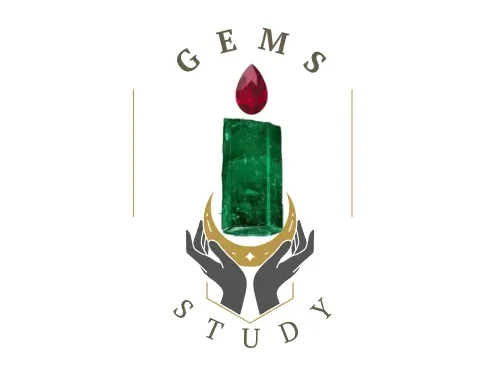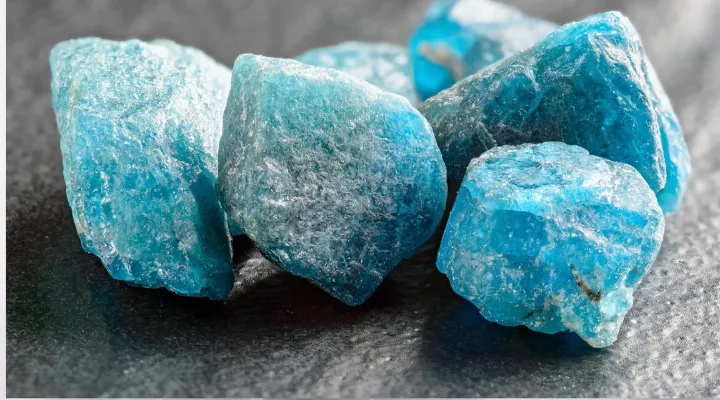Apatite gemstone, a group of phosphate minerals, is known for its vivid colors, remarkable crystal structures, and many different uses including industrial applications to gemstones. The following is a comprehensive table that summarizes the origins, mines, discovery dates, colors, and other important information of different kinds of apatite, from A to Z.
| Type of Apatite | Origin | Colors |
| Asparagus Stone | Brazil, Canada | Green |
| Blue Apatite | Brazil, Madagascar | Neon blue, Electric blue |
| Cat’s Eye Apatite | Madagascar | Green, Yellow |
| Fluorapatite | Germany, Austria | Yellow, Green, Blue |
| Green Apatite | Brazil, Russia | Green |
| Hydroxylapatite | Canada, USA | Colorless, White |
| Moroxite | Norway, USA | Green, Blue |
| Yellow Apatite | Mexico, Madagascar | Yellow, Golden |
Key Descriptions and Histories
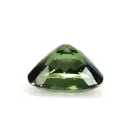
Asparagus Stone (Green Apatite)
Named for its unique asparagus-green color, this variety is mainly mined in Canada and Brazil. In the 19th century, it was initially identified by its green color. In metaphysical practices, green apatite is often linked with higher energy levels, which increases its value.
Blue Apatite
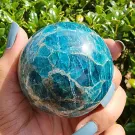
Neon blue apatite, a variety that is famous in Madagascar and Brazil, gains popularity as a result of its startling lighting blue color. The initial confusion was between this type and Paraiba tourmaline, which displays related colors. In jewelry, it is particularly favored due to its deep blue color, specifically in the Skardu region of Pakistan.
Geology Science Gemstones for Sale.
Cat’s Eye Apatite
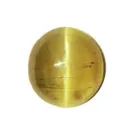
This variant is commonly seen in Madagascar and Sri Lanka and is identified by its unique chatoyancy , which creates a “cat’s eye” effect. In the early 20th century, this stone was discovered and its highly arresting effect is a result of light reflecting off of inclusions. Am Media.
Fluorapatite
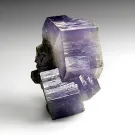
one of the most popular kinds is fluorapatite, which is named for its high fluorine material. Germany and Austria are the primary locations for its extensive mining. It is frequently discovered in a range of colors, such as yellow and blue. This variety is essential for the production of fertilizers. Gemstones for Sale.
Green Apatite
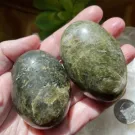
Similar to the Asparagus Stone, green apatite is sourced from Russia and Brazil. In the early 20th century, it was first identified, and its vibrant color has been linked to trace numbers of rare earth elements. Also, green apatite from the Minas Gerais region in Brazil is highly valued in the gemstone market
Hydroxylapatite
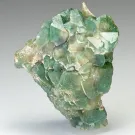
Hydroxylapatite is a naturally found mineral in biological systems that is responsible for the formation of bones and teeth in humans. It is of interest to scientists due to its unique biological properties, even though not being a regular gemstone. Major deposits are found in the United States and Canada. Gemstones for Sale.
Moroxite
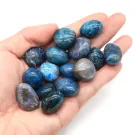
primarily found in Norway and Russia, Moroxite is a blue-green version of apatite. Among collectors, it is highly sought after due to its relatively uncommon appearance and bright colors .Gemstones for Sale.
Yellow Apatite
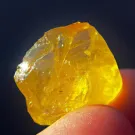
Mined primarily in Mexico and Madagascar, yellow apatite is highly valued for its golden color. Discovered in the 1900s, it is frequently employed in metaphysical therapy to improve creativity and health. Gemstones for Sale.
Why Apatite Is Valuable
Not only is apatite highly valued for its aesthetic appeal, but it is also valued for its rarity and diverse colors. Its vivid colors and rarity elevate its value, particularly among collectors, even though its relatively low hardness rating (approximately 5), which renders it softer for everyday wear. Additionally, neon blue apatite and other varieties have attracted attention in the gemstone market because of their similarity to more expensive stones, such as Paraiba tourmaline.
Many different kinds of apatite are also praised for their metaphysical properties. Green apatite is associated with personal growth and renewal, while blue apatite is believed to help communication and self-expression.
Origins and Mining
Major deposits of apatite are located in Brazil, Madagascar, Mexico, and Pakistan, and it is found on a global scale. Madagascar is the source of some of the most exquisite bright blue apatite, while Brazil is known for its green and yellow-colored varieties. Key participants in the apatite market include mining locations such as Minas Gerais in Brazil and Skardu in Pakistan.
FAQs about Apatite
Q1: What makes blue apatite so special?
Blue apatite, particularly neon blue varieties, is renowned for its vivid color, which closely resembles the much rarer and more expensive Paraiba tourmaline. Its vibrant electric blue hue makes it highly desirable in the gemstone market.
Q2: Is apatite durable enough for daily wear?
Apatite is relatively soft, ranking 5 on the Mohs hardness scale, so it is not ideal for rings or bracelets that might endure daily wear. However, it is perfect for earrings and pendants.
Q3: How is apatite formed?
Apatite forms primarily through igneous and metamorphic processes. It crystallizes in various environments, including volcanic activity and high-pressure metamorphic rocks Geology Science.
Q4: What are the metaphysical properties of apatite?
Apatite is believed to enhance creativity, clear communication, and help with personal growth. Blue apatite is associated with the throat chakra, aiding in self-expression, while green apatite is linked to the heart chakra, promoting healing and renewalGemstones for Sale.
Q5: Where is the best blue apatite found?
The finest blue apatite, especially the neon variety, is typically found in Madagascar, though high-quality stones also come from Brazil and Pakistan Geology Science Gemstones for Sale.
By understanding the origins, varieties, and value of apatite, gemstone enthusiasts can appreciate the unique beauty and diverse appeal of this captivating mineral family.
